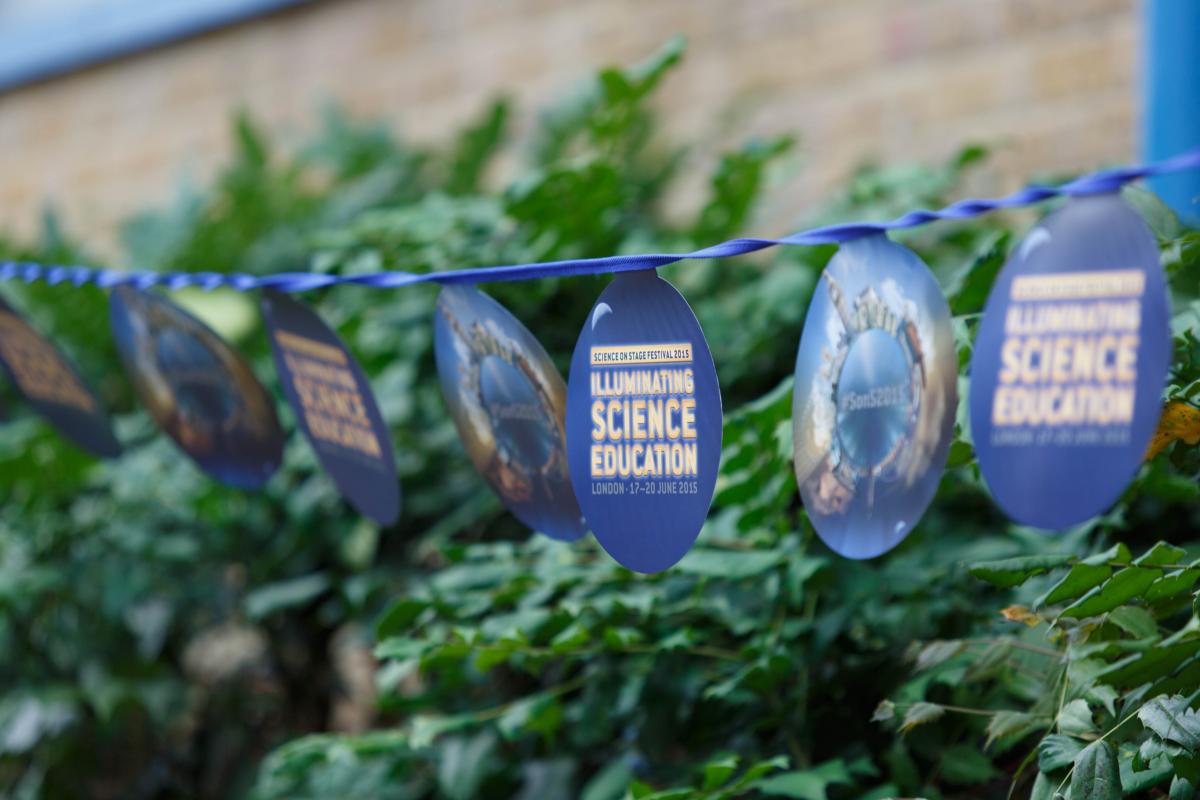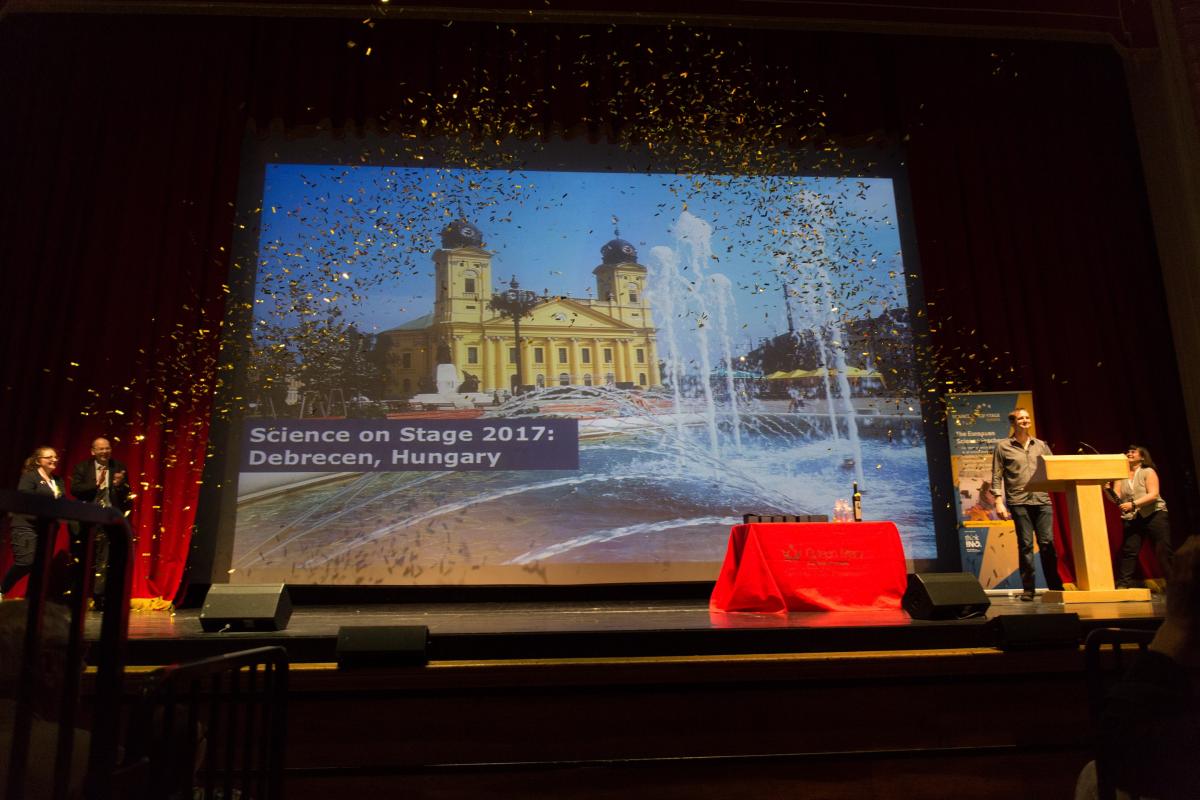Science teaching in the spotlight Inspire article
A packed schedule brought teachers from across Europe and Canada to share ideas, best practice and a lot of fun.
The East London campus of Queen Mary, University of London, UK, saw explosions, laughter and a buzzing atmosphere in June 2015 as 350 science teachers from across Europe and Canada gathered to share classroom ideas and projects at the 2015 Science on Stage festival. For some countries the summer holidays had already begun, which meant that many teachers at the festival had given up their free time to come to London. Teachers whose school year hadn’t yet finished had taken valuable time off from teaching. This alone shows just how important the teachers – and their schools – thought it was to attend.
“This is a unique opportunity for teachers from all over the world to get some fantastic ideas about science teaching,” said Charlotte Thorley, Chair of the UK national steering committee, and festival director. “We want them to leave with a hundred plans to help improve their teaching rather than just a bag full of leaflets that they’ll never look at again.”

The ninth Science on Stage festival was subtitled ‘Illuminating science education’, a suitable theme given that 2015 is the International Year of Light. Because of the theme, many of the attendees focused on different aspects of light, but that didn’t mean that physics was the only feature: the festival also had a lot of chemistry, biology and mathematics on display.
At the launch event, attendees were treated to insights into computer vision (known as image salience) from the vice-principle for public engagement and student enterprise at Queen Mary, Peter McOwan. But the message that will probably stay with most attendees is how easily our vision can be tricked as we focus on the ‘important’ parts of an image.
The magic tricks that McOwan performed on stage could have been a metaphor for the whole festival – with so much to see, it was difficult to ensure that things weren’t overlooked. Several attendees felt that the festival could have run even longer than four days. “It really could have been a whole week,” said UK chemistry teacher Kristy Turner.
As at previous festivals, the attendees had been selected in a series of national events and competitions to represent some of the best teachers and projects in their countries. All the representatives set up stalls at which they held demonstrations – on radical new ways of teaching science to children with disabilities, the science of Harry Potter, teaching fractals through Islamic tiling, and ways to involve pupils in research and development that has real industrial applications.
Many delegates loved discovering how their colleagues in other countries used simple techniques to demonstrate more complicated concepts. For example, Spanish teacher Jose and Linda from Italy bonded over their love of different geometric forms. Linda explained how she used 3D pens, which extrude a small amount of plastic, to get her students used to manipulating surfaces in three dimensions in a very tactile and visual way – an approach that Jose described as “fascinating”. Throughout the festival, the words of Stephanie Schlunk from the opening ceremony were being demonstrated: “Science on Stage is by teachers, for teachers.”
Some of the attendees were also selected to give demonstrations and lectures or to hold workshops for smaller groups, including one tasty workshop from a Swiss representative who used molecular gastronomy to create an eggless chocolate mousse that used just melted chocolate, ice and a lot of whisking. And, of course, the festival feeling was enhanced by the national foods that everyone brought along and shared.

After a busy Friday that saw celebrations continue into the night, including biology-themed ceilidh dancing, the slightly tired participants gathered for the final day. All the participants at the international Science on Stage festival were already winners: they had been selected from among thousands of teachers across Europe and Canada for their innovative ideas. But there were additional prizes for some lucky participants (see box below), before the details of the next festival were announced in a cloud of golden glitter. The 2017 Science on Stage festival will take place from 29 June to 2 July in Debrecen, Hungary.
Originally, Science on Stage was the brainchild of EIROforumw1, the publisher of Science in School. The organisation is now funded mainly by Think Ing, an initiative of the German Association of the Metal and Electrical Industry Employers (Gesamtmetall), which aims to improve science teaching in Germany and Europe. If you would like to take part in your national event – and maybe even be selected to attend the next international festival – contact your national organisers via the Science on Stage websitew2. The national calls will start from autumn this year. And if you want to see what was shared in London, take a look through the virtual poster fair from the eventw3.

The winning projects
All projects at the 2015 Science on Stage festival represented inquiry-based learning approaches and were judged based on how well they:
- promote students’ interest in science;
- refer to everyday life;
- have a sustainable effect;
- are feasible in everyday school life and can be financed with reasonable expenses;
- promote inquiry-based learning.
The winners were:
- Diane-Marie Campeau from Canada, whose project ‘The land is the teacher’ used indigenous pedagogy, the land and its resources as a framework to do interdisciplinary science.
- Renata Rydvalová from the Czech Republic, whose project ‘Honey kingdom’ allowed primary-school and kindergarten children to explore the world of bees and so learn biology, maths, physics and chemistry.
- Gregor von Borstel, Andreas Böhm, Manfred Eusterholz and Andy Bindl from Germany, who developed their ‘Bodyheater, heater meals and active O2’ experiments to integrate the teaching of various chemical concepts using real-world examples. An earlier version of the project was published in Science in School.
- Hans Mulder from the Netherlands, whose low-budget sea aquarium used inexpensive materials and allowed students to study the feeding habits of shellfish and Nereis virens (a harmless bristle worm) directly, instead of relying on dissection.
- Thierry Dias and Jimmy Serment from Switzerland, whose project ‘Learning by doing in mathematics’ offered several innovative, aesthetic and playful learning scenarios in mathematics, using origami, puzzles and large geometric structures to understand how different shapes fit together.
- And finally, Colin Inglis from the UK, whose project ‘Natural alternatives to antibiotics: scientifically sound or muddled myth?’ involved school children and suggested plants that are traditionally thought to have antimicrobial properties. The students then tested the essential oils to establish if they could be used as natural alternatives to antibiotics, before likely candidates were passed to the University of York, UK, for further analysis.
Web References
- w1 – EIROforum is a collaboration between eight of Europe’s largest inter-governmental scientific research organisations, which combine their resources, facilities and expertise to support European science in reaching its full potential. As part of its education and outreach activities, EIROforum publishes Science in School.
- w2 – Find out more about Science on Stage Europe and how you can get involved.
- w3 – The Science on Stage UK website hosts a searchable virtual fair for the 2015 festival where you can view the delegate posters, including all of the winning projects.





